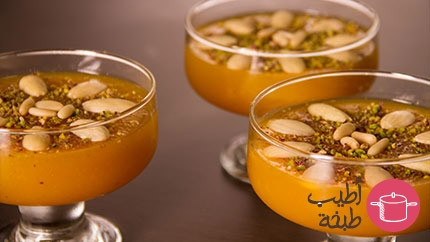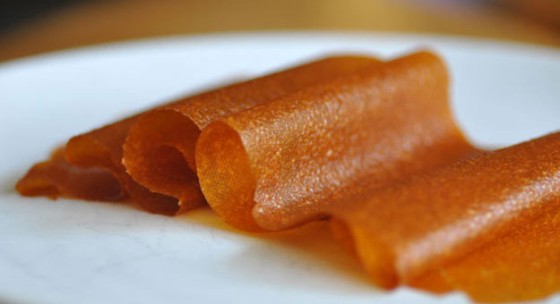Qamar ad-deen, or apricot juice, is a traditional beverage of Ramadan. Translated from Arabic it means “moon of the religion”.
As the moon enters Ramadan, qamar ad-deen enters our kitchens.
A refreshing cup of qamar ad-deen is a blessing from Allah after a long, hot day of fasting in the summer.
It provides instant relief, bringing happy gratitude that needs no explanations. We all just sit and smile!
Related to peaches and plums, apricots are scientifically identified as Prunus armeniaca.
While the Latin name implies apricots originated in Armenia, records indicate their historical existence throughout the Mediterranean region and as far as India.
The Many Blessings of Apricots
Fresh apricots are among the many blessings Allah provides for fasting the longer hours of summer.
While dried apricots and sheets of traditional dried apricot paste are internationally available year-round, fresh apricots are a seasonal treat available only in summer’s early months.
Both fresh and dried apricots provide excellent health benefits.
Full of vitamins, minerals and antioxidants, apricots improve heart health, reduce cholesterol, prevent bone diseases and vision loss, help respiratory conditions and aid in maintaining the body’s electrolyte balance.
Qamar ad-deen is rich in potassium, especially helpful while fasting since it helps to regulate body fluids.
Potassium helps maintain a healthy blood pressure, regulates the heartbeat, and protects the brain from stroke and the liver from shutting down. Potassium also provides important protection from toxins.
Rich in pectin and cellulose, apricots are a mild laxative, flushing waste from the digestive tract.
Qamar ad-deen creates an alkaline environment in an empty stomach, neutralizing stomach acids responsible for hunger pains.
Drinking qamar ad-deen can also alleviate the sensation of hunger, promoting healthy weight loss.
Much of the Muslim world experiences dry, dusty conditions during the hot days of summer.
Apricots contain protective anti-asthmatic properties beneficial for such conditions.
The minute amount of essential oil contained in apricots brings natural expectorant and stimulant activity to the lungs.
However, with all these benefits, a few precautions are wise.
Sulfites used to dry apricots, prunes, and raisins can be problematic, especially for asthmatics.
According to Healthy Eating, “A sulfite reaction can cause symptoms very similar to an allergic reaction, such as wheezing and difficulty breathing.”
Asthmatics and people with known food allergies to peaches, prunes, etc. should consult a medical professional before consuming fresh and/or dried apricots.
Erq Soos Licorice Juice
Known as erq soos, licorice juice is another favorite Ramadan beverage throughout North Africa and the Middle East.
Licorice juice is traditionally believed to be a natural, healthy substance, useful for quenching and controlling thirst.
It is thus often liberally consumed after long, hot days of fasting.
However, as with many normally healthy products, overconsumption of licorice juice is extremely dangerous and possibly even fatal.
Commonly known as licorice, Glycyrrhiza glabrais a member of the pea family.
The extract is called glycyrrhiza, from the Greek term glykos, meaning sweet, and rhiza, meaning root.
It’s used to sweeten soft drinks, foods and herbal medicines.
Serious risks are associated with excess licorice consumption, including:
• High licorice consumption while pregnant can cause miscarriage or early delivery.
• It lowers testosterone levels in men, decreasing their libido and worsening erectile dysfunction.
• It raises blood pressure and increases the risk of irregular heartbeat.
• It causes water retention, making congestive heart failure worse.
• It dangerously decreases potassium. Lowered potassium is common with many medical conditions. So if your potassium is already low, licorice consumption is very dangerous.
How Much is Too Much?
A recent study, titled Licorice Abuse: Time to Send a Warning Message, documents a significant risk of toxicity related to drinking erq soos licorice juice, especially at levels commonly consumed in Ramadan.
“Despite its apparent use in a few clinical scenarios,” states the report, “the daily consumption of licorice is never justified because its benefits are minor compared to the adverse outcomes of chronic consumption.”
The study tells of a 35-year-old man from Egypt, with no past medical history, admitted to the emergency room with apparent total paralysis of his limbs.
Although conscious and talkative and in otherwise good health, his blood pressure was an alarming 200/110 millimeters of mercury (mmHg) with a heart rate of 90 beats/min.
After controlling his blood pressure, the patient remained paralyzed with low potassium levels despite intravenous potassium replacement.
On further questioning, he admitted drinking one liter of erq soos daily during the whole month of Ramadan.
With continued therapy, it took ten days for his motor functions to return and for his potassium levels to normalize.
Upon regaining full muscle power, the man was released with a warning to avoid erq soos.
Although licorice has US FDA approval as a food supplement, there are no regulations to prevent toxicity.
As the study’s authors say, “We hope that this review will serve as a warning message that should be transmitted from physicians to patients to avoid excessive licorice intake as well as a message to the FDA to start regulating the use of this substance.”
They also recommend increasing public awareness “through TV commercials, newspapers, Internet sites, magazines and product labels regarding the upper limit of ingestion and health hazards associated with excess intake.”
It may still be ok to drink licorice juice, but in a very small quantity and rarely throughout the holy month.
(This article originally appeared on OnIslam.net)




